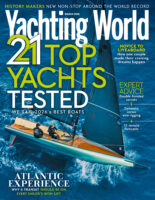Will America's Cup World Series deal show Plymouth Council to what's already on their patch?
©sportenvironment.com/Roy Riley
The following is a blog I posted yesterday, which must now be preceded with a grovelling correction. I’ve referred to the Rolex Fastnet Race as one of the lost opportunities. It has been pointed out to me by the Editor that I am clearly suffering from CRAFTs disease (Can’t Remember a ******* Thing) because I’m thinking of the 2007 race, not the last one in 2009.
He puts me right that the 2009 race (the Fastnet is biannual) ended with the fleet together in Sutton Harbour, which is adjacent to the central Barbican area. Not only that but that it coincided with the start of the British Fireworks Festival and there was a tented village on the Barbican.
So I’m sorry for that and I offer a grovelling apology for getting my races mixed up and failing to acknowledge that the organisers and city have worked to update and promote the race. As I wasn’t there, I can’t comment on what it was like, but David Glenn (who did the Fasnet on Liara) says it was great, “the sky was alight at night and the place was heaving.”
Here is the original blog with these important corrections in square brackets.
Having spent a rumoured €500,000 on attracting the America’s Cup World Series to Plymouth, let’s hope Plymouth City Council have some ideas of how to get value from and promote the event.
In the last few decades their track record of enthusing the public about major sailing events on their patch has been poor.
The Rolex Fastnet Race was mentioned as one of the highest profile event traditionally attached to Plymouth. [But even this legendary race seems to have failed to excite the city fathers.]
The last [2007] race ended, as before, in an ultra low key winner’s arrival at Queen Anne’s Battery (QAB) Marina. There were a few RORC race officials, a handful of journalists and some family and friends on the pontoons. That’s it.
QAB marina is a hike from the city centre, impossible to park at and not somewhere you would drop by to soak up the atmosphere. Not that there was any. In recent years there has been almost no indication for the public as to what the race was all about or any reference to its rich and illustrious history.
Great and once crowd-pulling events such as the OSTAR and the Round Britain Race [which start from QAB] attract only a handful of casual observers before race starts. I’ve been to them all in recent years and it’s a sad sight and a wasted opportunity to promote British sailing.
There was no buzz, no atmosphere, no access to the pontoons, no public conferences, no explanatory displays, no race village, and no apparent investment, support or even interest from the city.
Famous events that would cost little to promote have been allowed to wither as spectator sports. It is little wonder that the UK has seen a catastrophic erosion in the profile of its indigenous sailing events and international reputation. At the same time it has become progressively harder for top British sailors to raise sponsorship.
The shining exception to this in recent years was the Artemis Transat Race in 2008 (spectators pictured above), when Mark Turner’s then OC Events used all its expertise in organising the Barcelona World Race and the iShares Cup to spectacular effect.
OC Events took the single-handed transatlantic race to the heart of Plymouth, the Barbican, and replaced the traditional billowing press marquee with a multi-storey race centre with a champagne bar, café, VIP areas and a Formula 1 style venue for bluechip sponsors and city worthies.
In a partnership with the city, there were public interviews, explanations of the yachts and their skippers, a celebration of the solo transatlantic race’s history, a rolling programme of music and entertainment, a French food market and a festival atmosphere that pulled in sailors and non-sailors by the thousands.
This is the kind of partnership other sailing event organisers with an event worth shouting about need to get to grips with, and the city needs to foster. Because it’s not just the sporting action that makes these races valuable – maybe not even the sporting action – but the atmosphere of excitement and razzmatazz surrounding it. A great event has to provide a fantastic family day out.
Plymouth City Council should have another look at the other great sailing events that land in their laps and ask if they can play a bigger part in building these up as international events.




